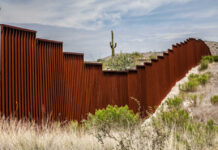
Sen. Tim Scott (R-SC) announced this weekend that he was leaving the Republican presidential primary after failing to gain traction against former President Donald Trump and a number of other candidates. The news could make the field simpler for the former president ahead of the first nominating contests in January 2024.
Scott made the announcement during an interview with Fox News on Sunday. He told former Rep. Trey Gowdy (R-SC) that voters “who are the most remarkable people on the planet, have been really clear that they’re telling me, ‘Not now, Tim,’”
Despite leaving the race, the senator said that he would not be endorsing another candidate in the primary contest.
“The best way for me to be helpful is to not weigh in,” Scott said.
Furthermore, the senator said that he would not be on any presidential ticket next year. He said that being vice president “has never been on my to-do list.”
The former candidate had not announced that he would be suspending his campaign prior to his appearance on the news channel.
Scott had described his campaign as a “optimistic, positive message anchored in conservatism.”
Separately on social media, Scott wrote that traveling the country and “meeting all of you has been one of the most fantastic experiences of my entire life.”
He thanked the voters in his statement.
Tonight, I suspended my campaign for president.
Traveling this country and meeting all of you has been one of the most fantastic experiences of my entire life.
From the bottom of my heart, thank you.
God Bless the United States of America. pic.twitter.com/yniJWQMW1N
— Tim Scott (@votetimscott) November 13, 2023
The senator’s announcement came after reports that his campaign was spending money far quicker than it was raising it.
Scott’s campaign had spent $12.4 million in the previous quarter but raised only $4.6 million.
Despite the high spending and a number of high-profile campaign appearances, Scott was polling at 2.5% in the RealClearPolitics polling average. In his home state of South Carolina, he was polling less than 8%.
Last month, a pro-Scott political action committee (PAC) stated that it would not be purchasing a number of ads supporting their candidate in order to not “waste our money when the electorate isn’t focused or ready for a Trump alternative.”
The candidate was unlikely to qualify for the next debate held on Dec. 6 in Alabama.














